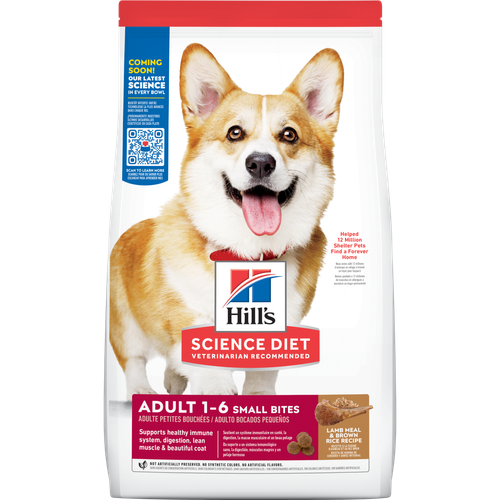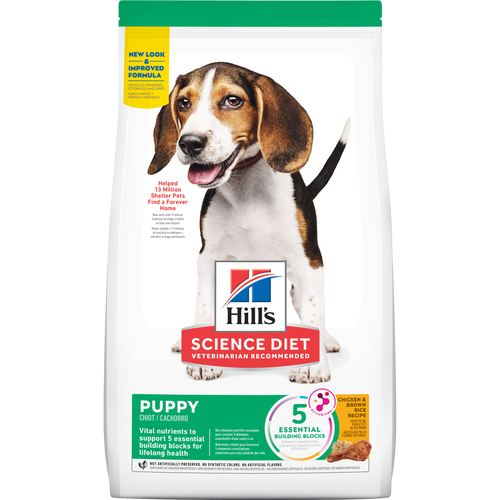
-
Find the right food for your petTake this quiz to see which food may be the best for your furry friend.Find the right food for your petTake this quiz to see which food may be the best for your furry friend.Featured products
 Adult Small Bites Chicken & Barley Recipe Dog Food
Adult Small Bites Chicken & Barley Recipe Dog FoodSupports lean muscle for dogs who prefer smaller kibble
Shop Now Hill's Science Diet Adult Oral Care Chicken, Brown Rice & Barley Recipe Dog Food
Hill's Science Diet Adult Oral Care Chicken, Brown Rice & Barley Recipe Dog FoodClinically proven kibble technology to reduce plaque & tartar build-up
Shop Now Adult Small Bites Lamb Meal & Brown Rice Recipe Dog Food
Adult Small Bites Lamb Meal & Brown Rice Recipe Dog FoodSupports lean muscle, for dogs who prefer smaller kibble
Shop NowFeatured products Hill's Science Diet Adult 7+ Healthy Cuisine Roasted Chicken & Rice Medley Cat Food
Hill's Science Diet Adult 7+ Healthy Cuisine Roasted Chicken & Rice Medley Cat FoodDelicious roasted chicken and rice in a mouthwatering sauce
Shop Now Adult Perfect Digestion Chicken, Barley & Whole Oats Recipe Dog Food
Adult Perfect Digestion Chicken, Barley & Whole Oats Recipe Dog FoodScience Diet's breakthrough nutrition supports ultimate digestive well-being & healthy microbiome
Shop Now Adult Perfect Digestion Salmon, Whole Oats, and Brown Rice Recipe Dog Food
Adult Perfect Digestion Salmon, Whole Oats, and Brown Rice Recipe Dog FoodScience Diet's breakthrough nutrition supports ultimate digestive well-being & healthy microbiome
Shop Now -
Featured articles
 The Incredible Science Behind Your Pet's Microbiome
The Incredible Science Behind Your Pet's MicrobiomeLearn what a pet's microbiome is, how it contributes to your pet's gut & overall health, and why nutrition is important in maintaining healthy microbiomes.
Read More Water
WaterDiscover why water is the most important nutrient for your dog or cat to live a healthy life. Find out how much water your pet should consume each day.
Read More Pet Food Storage Tips
Pet Food Storage TipsDiscover how and where to store your dry, as well as canned, dog and cat food. Learn how to find the "best before" dates on all Hill's pet food packaging.
Read More -


When it comes to choosing a dog food, you might find yourself overwhelmed with the number of types available. With so many brands and formulas, deciding which is the best dog food can be difficult. But there are certain things to look for when determining the best option for you and your dog.
The old adage, "You are what you eat" holds true for dogs, so it's important to remember that nutrition is essential. Adequate nutrition helps your dog grow, stay strong, maintain a healthy coat and immune system, and provide energy for playtime. When breaking down nutrition and choosing a food, there are some key factors to consider.
Balanced Nutritional Formula
When choosing the best dog food for your pup, the nutritional value of the food is the first factor you should inspect. The Association of American Feed Control Officials (AAFCO) has established guidelines for regulators to govern claims a pet food company can make on its label. A balanced food should contain healthy ingredients, such as protein from an animal source, vegetables, whole grains and micronutrients like omega-3 fatty acids.
When it comes to individual ingredients, it's important to note that foods said to contain a single ingredient must include at least 95 percent of said ingredient, not counting water. For instance, if the formula claims to be made solely of beef, beef makes up 95 percent of the food. Another idea to consider is the food type. Phrases and the labels "dinner," "platter" or "entree" require that the food contains at least 25 percent of the named ingredient. So a chicken dinner might actually only contain 25 percent chicken.
There are wet foods, dry foods, dehydrated foods and even frozen-thawed foods that are available to your dog. You'll have to decide which offers the best nutritional value for your particular pup and make sure that your dog enjoys eating it. For example, freezing food changes the taste of canned wet food, so there's a chance your dog won't be a fan of it.
Once you know how to identify the ingredients you want in your dog's food and which you'd prefer to avoid, you can use your dog's opinion to decide which is the most flavorful delivery. The best dog food is a completely balanced food that your dog will enjoy!
Age and Lifestyle
Your dog is unique and needs to be treated as such. This means that the best dog food for one dog might not be so great for another. First, consider the size of your dog. A Great Dane and Chihuahua are going to need very different amounts of nutrients and different amounts of food altogether. There may be various sizes of kibble and cans that are geared toward the size of your dog.
Next, evaluate your dog's age. A puppy is still growing and is going to need different nutrients than a sedentary senior dog. Puppies generally need vitamins and minerals that encourage healthy growth and development, while seniors need fewer calories and added supplements to help their aging bones and joints. Again, a Great Dane puppy is going to need nutrition that supports a very large, quickly growing body while a Chihuahua puppy will likely need a more steady intake throughout his life.
Pregnant and lactating females require a special formula to sustain their and their puppies' bodies. For example, because she's expending a lot of energy sustaining her puppies, a pregnant dog needs a calorie-rich food. Special nutrients, like protein and DHA, are needed to promote healthy puppy development. If you have a pregnant and lactating dog, be sure to ask your veterinarian what dog food you should be feeding her.
Your dog's lifestyle determines the amount of food and nutrition needed as well. Working dogs such as police dogs and search and rescue dogs are constantly on the go. Their hard-working bodies are going to need a lot of nutrition for active energy to keep up with them. They'll need a lot more food that your average couch potato dog won't need.
The less your dog moves around, the fewer calories he needs, says PetMD. You want to prevent obesity and maintain a healthy weight and body condition throughout your dog's life, so tailored nutrition is key.


Tasty Tips
Ailments and Illnesses
Certain ailments and illnesses require a change in food or a new food altogether. In fact, there are many foods made for dogs suffering from specific conditions, such as diabetes and renal failure. These foods were developed by veterinarians and scientists to make up the ideal nutritional content for dogs living with these diseases. They contain ingredients known to assist in the recovery and management of said ailments and ensure that your dog is getting the right nutrition at the right time. Sometimes you might need to have your dog on a special food after a procedure or during a short-term recovery before you switch back to his regular food. (Remember, if you're switching from one food to another, do so gradually.) Other times, this special food may be the staple for the rest of your dog's life. Whichever is best depends on your dog, the condition and your veterinarian's expert opinion.
What Is the Best Dog Food?
So, is there a one-size-fits-all dog food that is the best? The answer: no. It all depends! Every dog is different. Before choosing a dog food, take stock of your pup's age, lifestyle and medical conditions to find the best one. One of the biggest things to take into consideration when choosing the best dog food is the care that goes into crafting it. Does the company spend lots of time on research and nutritional advancement? Do they employ active veterinarians and pet nutritionists qualified to determine a food's nutritional efficiency for your pup? Do they source their ingredients from reputable suppliers, and adhere to strict quality and safety standards? There is a lot more that goes into choosing a dog food that is best for your pup than understanding the ingredients that go into it.
Finally, never fall victim to fads and trends that you see from non-reputable, non-qualified sources. This includes human food trends and applying your food preferences to your pet. In this day and age of information, you have ample ability to do research on each food you are considering. Do your own dog food comparisons, looking at things like nutritional value, price valuation, ingredient comparisons, manufacturing and quality standards, industry experience and more. You know your dog the best, and you want to do best by him, so make sure to do your due diligence when deciding. If you're still not confident, consult your veterinarian. Not only can they give you recommendations, they can inform you on the exact nutrition your pup needs to be his healthiest. Take their input and apply your own research, to make the best decision for your pooch.
If you have any questions about Hill's products, do not hesitate to use our web chat feature and speak to a Hill's representative.


Katie Finlay is a pet trainer who lives in Southern California. She has been working with dogs and their owners both in person and through her online content for over six years.
Related products

Supports lean muscle, for dogs who prefer smaller kibble

Clinically proven kibble technology to reduce plaque & tartar build-up

Supports lean muscle for dogs who prefer smaller kibble

Vital nutrients to support 5 essential building blocks for lifelong health
Related articles

Gather the following puppy supplies to prepare your family for all the fun (and commitment) that comes with being a dog parent.

Learn how to stop your dog from begging at the dinner table, and understand how it can help contribute to his health.

Discover how the field of dog science is giving us more and more insights into the inner workings of our furry best friends.

Your dog's coat and skin are a big part of your dog's overall health. Ensure you keep your dog's coat healthy, by following these simple tips.

Put your dog on a diet without them knowing
Our low calorie formula helps you control your dog's weight. It's packed with high-quality protein for building lean muscles, and made with purposeful ingredients for a flavorful, nutritious meal. Clinically proven antioxidants, Vitamin C+E, help promote a healthy immune system.
Put your dog on a diet without them knowing
Our low calorie formula helps you control your dog's weight. It's packed with high-quality protein for building lean muscles, and made with purposeful ingredients for a flavorful, nutritious meal. Clinically proven antioxidants, Vitamin C+E, help promote a healthy immune system.


